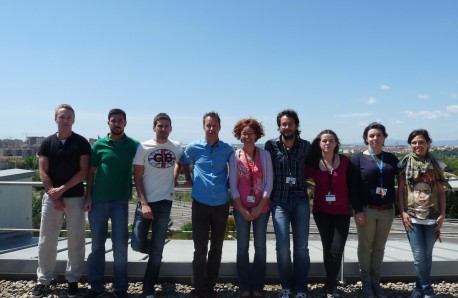Kleij
Research group

Research abstract
Our current research activities are split into two main directions: (1) the use of carbon dioxide as a C1 building block in organic synthesis using new and improved catalytic strategies, and (2) the application of appropriate building blocks for the development of smart materials. In the first area, we have been active in the preparation of organic carbonates for a number of years, focusing on sustainable solutions and improving activity and stereo-selectivity profiles. We are currently expanding our activities to other classes of compounds such as oxazolidinones, CO2-based (bio)polymers and more complex organic matter derived in tandem approaches. In the second area, we have developed systems that have allowed us to study chirality transfer effects and the development of new electronic materials. Connected to this latter activity, we wish to design systems that are able to control the nanoscopic features of self-assembled molecules either in the solution phase or on surfaces (single-molecule studies), with an aim to develop materials with interesting functions and/or catalytic properties.
Topics addressed
- Carbon dioxide chemistry
- Building blocks for the development of new materials
Articles
“Metal Mediated Coupling of Carbon Dioxide and Aryl/Vinyl Chlorides under Ambient Conditions”
ChemCatChem (2013) 5, 113-115
Arjan W. Kleij
“Unsymmetrical Octanuclear Schiff Base Clusters: Synthesis, Characterization and Catalysis”
Dalton Trans. (2013) 42, 1427-1436
Eduardo C. Escudero-Adán, Nicola Kielland, Marta Martínez Belmonte, Arjan W. Kleij
“A Trinuclear Bifunctional Catalyst Derived from a Tetraoxo Bis-Zn(salphen) Metalloligand”
Chem. Eur. J. (2013) 19, 2641-2648
Martha V. Escárcega-Bobadilla, Marta Martínez Belmonte, Eddy Martin, Eduardo C. Escudero-Adán, Arjan W. Kleij
“Conformational Studies of Template-Assisted Self-Assembled Molecular Capsules and the Use of their Rhodium Complexes in Hydroformylation reactions”
Catal. Sci. Technol. (2013) 3, 1955-1963
Ivo Jacobs, Adri C. T. van Duin, Arjan W. Kleij, Mark Kuil, Duncan M. Tooke, Anthony L. Spek Joost N. H. Reek
“A Powerful Aluminium Catalyst for the Synthesis of Highly Functional Organic Carbonates”
J. Am. Chem. Soc. (2013) 135, 1228-1231
Christopher J. Whiteoak, Nicola Kielland, Victor Laserna, Eduardo C. Escudero-Adán, Eddy Martin, Arjan W. Kleij
“Supramolecular Bulky Phosphines Comprising of 1,3,5-Triaza-7-phosphatricyclo[3.3.1.13,7]-decane and Zn(salphen)s: Structural Features and Application in Hydrosilylation Catalysis”
Dalton Trans. (2013) 42, 7595-7603
Daniele Anselmo, Rafael Gramage-Doria, Tatiana Besset, Giovanni Salassa, Eduardo C. Escudero-Adán, Marta Martínez Belmonte, Eddy Martin, Joost N. H. Reek, Arjan W. Kleij
“DFT Study on the Mechanism for the Cycloaddition Reaction of CO2 to Epoxides Catalyzed by Zn(salphen) Complexes”
Chem. Eur. J. (2013) 19, 6289-6298
Fernando Castro-Gómez, Giovanni Salassa, Arjan W. Kleij, Carles Bo
“Stereochemical Divergence in the Formation of Organic Carbonates Derived from Internal Epoxides”
Adv. Synth. Catal. (2013) 355, 2233-2239
Christopher J. Whiteoak, Eddy Martin, Eduardo Escudero-Adán, Arjan W. Kleij
“Merging Catalysis and Supramolecular Aggregation Features of Triptycene based Zn(salphen)s”
Dalton Trans. (2013) 42, 7962-7970
Daniele Anselmo, Giovanni Salassa, Martha V. Escárcega-Bobadilla, Eduardo C. Escudero-Adan, Eddy Martin, Arjan W. Kleij
“CO2 Conversion into Organic Carbonates using a Metallosalen Catalyst: New Insights from DFT Analysis”
ACS Preprints, Division of Energy & Fuels (2013) 58, 259
G. Salassa, F. Castro-Gómez, C. Bo, A. W. Kleij
“Stereoselective Synthesis with Carbon Dioxide”
Adv. Synth. Catal. (2013) 355, 2115-2138.
Nicola Kielland, Christopher J. Whiteoak, Arjan W. Kleij
“Nanorings and Rods Interconnected by Self-Assembly Mimicking an Artificial Network of Neurons”
Nature Commun. (2013) 4, 2648 (DOI: 10.1038/ncomms3648)
Martha V. Escárcega-Bobadilla, Gustavo A. Zelada-Guillén, Sergey V. Pyrlin, Marcin Wegrzyn, Marta M. D. Ramos, Enrique Giménez, Andrew Stewart, Gerhard Maier, Arjan W. Kleij
“Catalyst Development in the Context of Ring-Expansion Addition of CO2 to Epoxides Affording Organic Carbonates”
Synlett. (2013) 24, 1748-1756
Christopher J. Whiteoak, Arjan W. Kleij
“High Activity and Switchable Selectivity in the Synthesis of Cyclic and Polymeric Cyclohexene Carbonates with Iron Amino Triphenolate Catalysts”
Green Chem. (2013) 15, 3082-3090
Masoumeh Taherimehr, Syed M. Al-Amsyar, Christopher J. Whiteoak, Arjan W. Kleij, Paolo P. Pescarmona